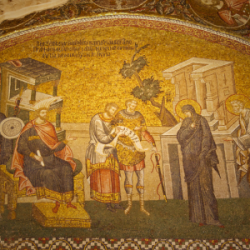But over time, another non-obvious fact became clear to me. The same search process by which I found the problems of Mormonism also helped me feast upon doctrines that continue "to enlarge my soul; to enlighten my understanding; to be delicious to me" (Alma 32:28).
Of the myriad blog posts and articles, and occasional books, some stand out:
1. Blake T. Ostler (Exploring Mormon Thought series) on how (perhaps only) Mormon assumptions about uncreated humans give human agency teeth.
2. Eugene England, on the application of this agency: how a God who weeps for lost children but cannot interfere with their freedom to reject His love explains evil. I already delighted in: "For it must needs be, that there is an opposition in all things" (2 Ne. 2:11); this was more good fruit. And any number of thoughtful commentators -- especially Brother Ostler -- on how concepts like faith, works, grace, salvation, theosis, covenants, sin, moral law, justice, and mercy are powerfully illuminated by the Book of Mormon and Joseph Smith's teachings.
Like most people, making myself reflect the ideas I believe requires models. I need someone I can identify with. Ideals are too abstract. Ex-Mormons provide one possibility. They often remember from their days as Church members rigid stances that were unresponsive to and disengaged from different ideas. "At the time, no combination of words could have turned my convictions," wrote Brad Morin. "My uncompromising zeal closed all avenues for discovering the error in my beliefs. I refused to question."
They also often recall the pride of Church members that incompletely masks disdain and insensitivity for non-Mormons. Brad recalls: "I once took great pride in Mormons and their goodness. I bristled whenever I heard someone criticize Utah Mormons."
Chris described his wife's distress when her nonmember parents were excluded from their temple wedding: "I thought to myself . . . given that they had not accepted the gospel that could make their family an eternal family, then surely our wedding could not be important to them."
Again, this is one model for viewing Mormonism. But it's not the one I ended up adopting. Rather, I found myself learning from Nephi's model: collective, self-examining repentance. That principle of collective, self-examining repentance is perhaps the most important strategy I discovered in identifying with the "informed and faithful" narrative. It allows me to confront human flaws and embarrassments as part of identifying with the "informed and faithful narrative." I'm convinced that, though such repentance is never perfect in practice, it is still foundational to Mormonism.
On this, Margaret Blair Young's essay ("Essay for June 9, 1998") reflecting on the ban prohibiting priesthood ordination for worthy black men struck me deeply. In explicitly or implicitly addressing secular critiques of Mormonism, the first step must be, as Sister Young implicitly does, to acknowledge the point of such critics. Yes, it is logically possible to believe with zeal falsehoods propagated by leaders. But acknowledging this is not the same thing as ignoring overwhelming evidence that the Church's main claims are false. Instead, it could mean that we are simply putting our stock in false beliefs that Church leaders are infallible, or that everything Church-related will be straightforward, neat, tidy, and clean.
Sister Young recalls the irony of a racist seminary teacher who believed that, after his many righteous years, he earned freedom from temptation: I've wondered if he ever grasped his self-deception, if he ever realized that the most dangerous, most tenuous place of all is an enclosed system where all things are set and known -- or pretend to be so. The inertia invited by a desire for absolute certitude and closure is either the setting for the second law of thermodynamics -- the tendency toward chaos -- it is simply death.
Reading that reflection of Sister Young, I felt some words of Nephi become real to me. I remembered that the ancient prophet had dished some choice language at enclosed systems -- or, at least, proponents of one type: "Wo be unto him that shall say: We have received the word of God, and we need no more of the word of God, for we have enough! Yea, wo be unto him that saith: We have received, and we need no more! For thus saith the Lord God: from them shall be taken away even that [wisdom] which they have" (2 Ne. 28:27, 29, 30).
Only a few verses earlier in the same chapter, Nephi had cautioned his readers against taking the erroneous position: "All is well in Zion; yea, Zion prospereth, all is well" (2 Ne. 28:21). This is how we are "pacified" and "lulled away into carnal security," with the result that Satan will lead us "carefully down to hell" (2 Ne. 28:21).




